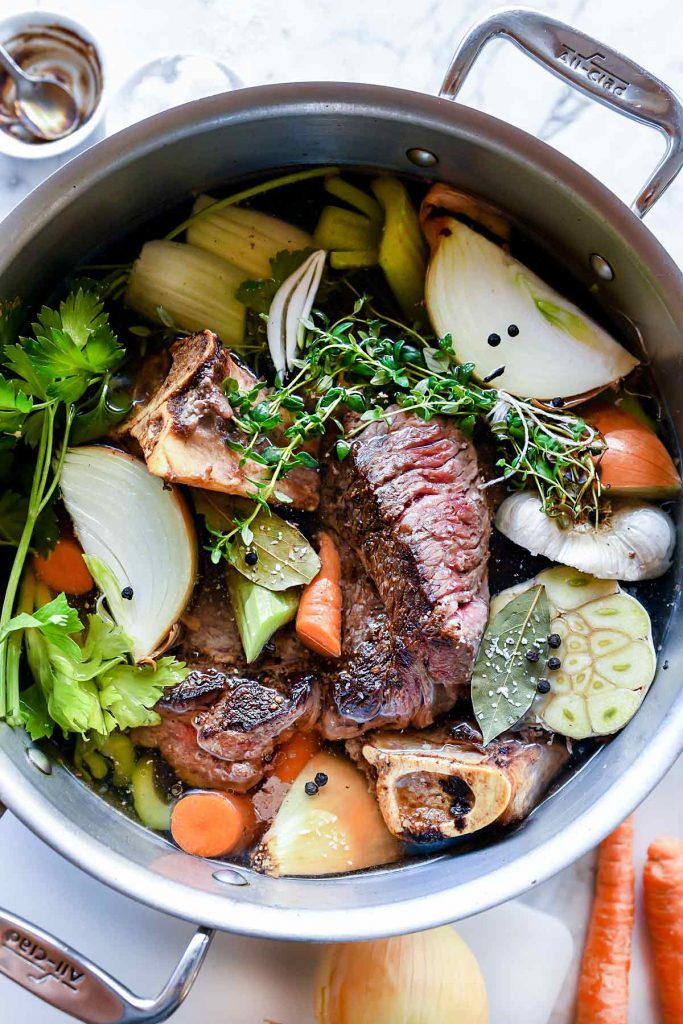How long do you cook stock?
Simmer uncovered for 6 to 8 hours. Strain stock through a fine mesh strainer into another large stockpot or heatproof container discarding the solids. Cool immediately in large cooler of ice or a sink full of ice water to below 40 degrees. Place in refrigerator overnight.
How long should you simmer beef bones to make a good quality stock?
Boil, then simmer for 4-8 hours for red meat bones, or 2-4 hours for poultry, depending how much time you have. White stock, which skips the browning step, has a paler colour and gentler flavour.
How do you know when stock is done?
You know your stock is done when the color turns a rich golden brown. The texture will be slightly gelatinous and may become more so as it’s cooled. Other than the occasional check in, you can go about the rest of your day and have a batch of delicious homemade chicken stock with hardly any effort at all.
How many hours does it take to simmer a meat stock?
Reduce heat to a very low simmer and cook with lid slightly ajar, skimming foam and excess fat occasionally, for at least 8 but up to 24 hours on the stovetop. (Do not leave on stovetop unattended, simply cool and continue simmering the next day.) The longer you simmer it, the better your broth will be.
Can you simmer stock too long?
Simmer Your Bones Long Enough, But Not Too Long Yet, if you cook your broth too long, it will develop overcooked, off flavors that can become particularly unpleasant if you’ve added vegetables to the broth pot which tend to breakdown, tasting at once bitter and overly sweet.
Can I leave stock simmering overnight?
It means you gave to clean all your flatware but it is less cleanup than having to put stock in every small pan you have to cool. According to this NYT article, it is safe to leave overnight with the stove turned off. In the morning, bring to a rolling boil for 10 minutes and then continue to simmer.
Why should stock not be boiled?
Just as when you’re making stock for soups or stews, boiling will cause soluble proteins and rendered fat to emulsify into the cooking liquid. By simmering, you avoid emulsifying the fat and thus keep the stock clearer, and we found that the scum created simply settled to the bottom of the pot.
Do you cover stock when simmering?
Always cover your pot if you’re trying to keep the heat in. That means that if you’re trying to bring something to a simmer or a boil—a pot of water for cooking pasta or blanching vegetables, a batch of soup, or a sauce—put that lid on to save time and energy.
What stock is the easiest to prepare?
Among the different types of stock, which one is the easiest to prepare? The vegetable stock is the easiest to prepare. This stock is made from white meat or bones.
Will boiling Stock kill bacteria?
Boiling does kill any bacteria active at the time, including E. coli and salmonella. Once they’ve germinated, bacteria multiply quickly in nourishing stock. They can double their numbers every 90 minutes at room temperature, every 15 minutes at body temperature.
Can I leave my stove on all night?
“A stove is designed to run indefinitely,” says Drengenberg. “Do we recommend that? Absolutely not.” While it’s not the best idea to leave an open flame unattended, If you leave your stove burner on, your house will, in all likelihood, not burn down. UL tests just about every stove that hits the market.

I’m Brian Danny Max, a chef and a writer at cookingtom.com. I’m here to talk about food and cooking, and to share some of my favorite recipes with you all! I’ve been interested in food and cooking since I was a child. My parents are both great cooks, and they taught me a lot about the kitchen. I’ve been cooking professionally for about 10 years now, and I’ve loved every minute of it! I specialize in healthy, flavorful recipes that are easy to make at home. I believe that anyone can cook a delicious meal, no matter their skill level. I’m here to help you learn how to cook, and to show you that it’s not as difficult as you might think! I hope you’ll check out my blog and my recipes, and I look forward to hearing from you!

